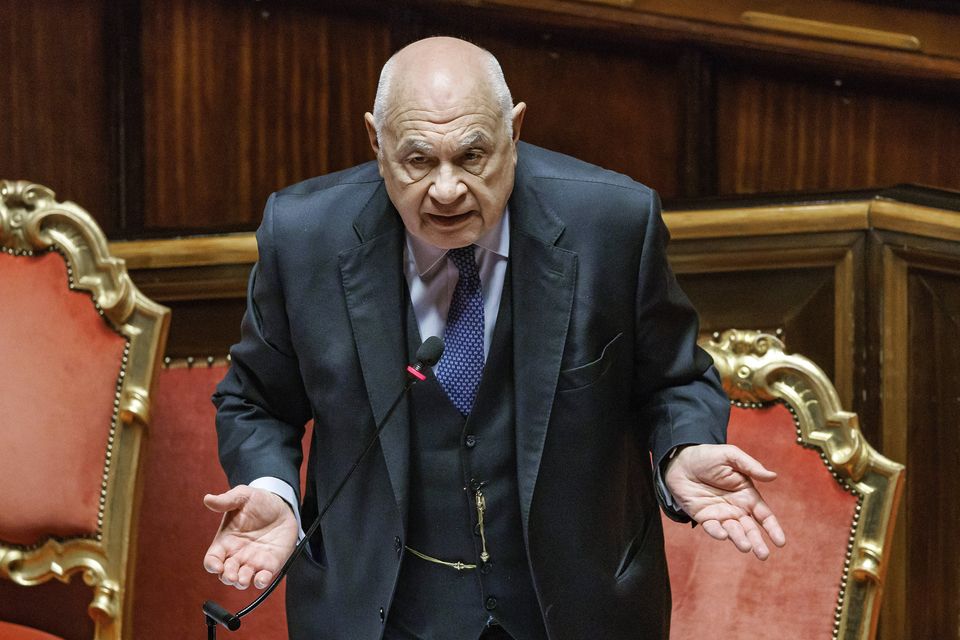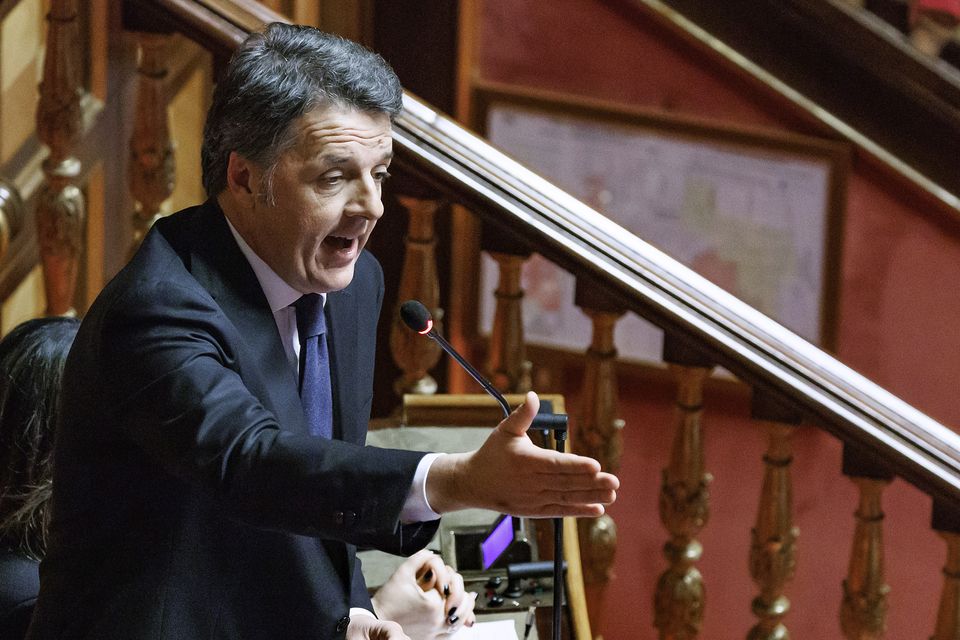Human rights groups have voiced outrage after Italy released a Libyan warlord who was arrested on a warrant from the International Criminal Court accusing him of war crimes and crimes against humanity.
The Hague-based court issued a more diplomatic response but its anger appeared evident.
In a stern statement late on Wednesday, the ICC reminded Italy that it is obliged to “cooperate fully” with its prosecutions and said it was still awaiting information about what exactly Rome had done.
Italian justice minister Carlo Nordio addresses the Senate during the report on the justice administration in Rome (Roberto Monaldo//LaPresse via AP)
The reaction came after the Italian government on Tuesday released and sent back home Ossama Anjiem, also known as Ossama al-Masri, who heads the Tripoli branch of the Reform and Rehabilitation Institution, a notorious network of detention centres run by the government-backed Special Defence Force.
Al-Masri had been arrested on Sunday in Turin, where he reportedly had attended the Juventus-Milan soccer match the night before.
The ICC warrant, dated the day before, accused al-Masri of war crimes and crimes against humanity committed in the Mitiga prison in Libya starting in 2015 that are punishable with life in prison.
The ICC said he was accused of murder, torture, rape and sexual violence.
It said the warrant was transmitted to member states on Saturday, including Italy, and that the court had also provided real-time information that he had entered Europe.
The court said it had reminded Italy at the time to contact it “without delay” if it ran into any problems cooperating with the warrant.
But Rome’s court of appeals ordered al-Masri freed on Tuesday, and he was sent back to Libya aboard an aircraft of the Italian secret services, because of what the appeals court said was a procedural error in his arrest.
The ruling said Justice Minister Carlo Nordio should have been informed ahead of time, since the justice ministry handles all relations with the ICC.
The ICC said it had not been given prior notice of the Rome court’s decision, as required, and “is seeking, and is yet to obtain, verification from the authorities on the steps reportedly taken”.
Al-Masri returned to Tripoli late on Tuesday, received at the Mitiga airport by supporters who celebrated his release, according to local media.
Former Italian premier Matteo Renzi makes his remarks during justice minister Carlo Nordio’s appearance at the Senate (Roberto Monaldo//LaPresse via AP)
Footage circulated online showed dozens of young men chanting and carrying what appeared to be al-Masri on their shoulders.
“This is a stunning blow to victims, survivors and international justice and a missed opportunity to break the cycle of impunity in Libya,” said Amnesty International’s Esther Major, deputy director of research for Europe.
Mr Nordio appeared in the Senate on Wednesday for a previously-scheduled briefing, and was grilled by outraged opposition legislators who demanded clarity about what happened.
Former premier Matteo Renzi accused the right-wing government of hypocrisy given its stated crackdown on human traffickers.
“But when a trafficker whom the International Criminal Court tells us is a dangerous criminal lands on your table, it’s not like you chase him down, you brought him home to Libya with a plane of the Italian secret services,” said Mr Renzi of the Italia Viva party.
“Either you’ve gone crazy or this is the image of a hypocritical, indecent government.”
The Democratic Party demanded Premier Giorgia Meloni respond specifically to parliament about the case, saying it raised “grave questions” given the known abuses in Libyan prisons for which al-Masri is accused.
Mr Nordio did not respond.
Italy has close ties to the internationally recognised government in Tripoli, on whom it relies to patrol its coasts and prevent waves of migrants from leaving.
Any trial in The Hague of al-Masri could bring unwanted attention to Italy’s migration policies and its support of the Libyan coast guard, which it has financed to prevent migrants from leaving.
The International Criminal Court in The Hague, Netherlands (Peter Dejong/AP)
Human rights groups have documented gross abuses in the Libyan detention facilities where migrants are kept, and have accused Italy of being complicit in their mistreatment.
Two humanitarian groups, Mediterranea Saving Humans and Refugees in Libya, which have documented abuses committed against migrants in Libyan detention facilities, said they were incredulous that Italy let al-Masri go.
Militias in western Libya are part of the official state forces tasked with intercepting migrants at sea, including in the EU-trained coast guard.
They also run state detention centres, where abuses of migrants are common.
As a result, militias — some of them led by warlords the UN has sanctioned for abuses — benefit from millions in funds the European Union gives to Libya to stop the migrant flow to Europe.
The European Commission spokesman reaffirmed all EU members had pledged to cooperate with the court.
“We respect the court’s impartiality and we are fully attached to international criminal justice to combat impunity,” said EU commission spokesman Anouar El Anouni.
In a 2023 summit, the EU leaders committed “to cooperate fully with the court, including rapid execution of any pending arrests,” he added.


